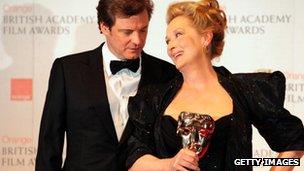Silent movie The Artist dominates 65th Baftas
- Published
- comments
Meryl Streep lost a shoe as she went to accept her award for best actress - Footage courtesy of BAFTA/BBC 2012
Silent movie The Artist has dominated the 65th Baftas, taking seven prizes including best film, best director and best actor for its star Jean Dujardin.
As well as his director prize, film-maker Michel Hazanavicius picked up the best original screenplay prize.
"Some people thought there was no script because there was no dialogue so the English are very clever," he said.
Meryl Streep won best actress for The Iron Lady, while Tinker Tailor Soldier Spy won outstanding British film.
The Artist's Dujardin, picking up best actor, said he was "thrilled to be in the company of such illustrious, talented actors" as fellow nominees Brad Pitt, Gary Oldman, George Clooney and Michael Fassbender.
"To receive this award from the country of Laurence Oliver, William Webb Ellis and Benny Hill is an honour," the Frenchman added.
Accepting his best director Bafta, Hazanavicius, who gave a series of colourful speeches, said he was thrilled that award presenter Pitt "said my name correctly".
"I know that I will have some bad days because I'm a director but I will remember this day, today, as a good day," he added.

Colin Firth presented best actress to his Mamma Mia! co-star Meryl Streep
The Artist is the story of silent movie actor George Valentin whose career is surpassed by his love interest Peppy Miller - played by Hazanavicius's wife Berenice Bejo - who becomes a star of the "talkies".
The film, the favourite for best picture at the Oscars on 26 February, also won prizes for best original score, cinematography and best costume design.
Bejo, together with My Week with Marilyn's Michelle Williams, We Need to Talk About Kevin's Tilda Swinton and The Help's Viola Davis, was beaten by Streep for her portrayal of Margaret Thatcher.
The 62-year-old actress, who has not won a Bafta since receiving one for The French Lieutenant's Woman in 1982, lost her shoe as she made her way to the stage of London's Royal Opera House.
"That couldn't have gone worse," she said.
"Somebody once said the fate of the well-known is to be misunderstood and the ambition of this film, The Iron Lady, was to look at the life of the Iron Lady from the inside out," she continued.
The aim, she went on, was "to locate something real, maybe hidden, but truthful in the life of someone we've all decided we know everything about already."
The Iron Lady, which follows Margaret Thatcher over a number of years, also won the award for best make-up and hair.
Octavia Spencer beat Jessica Chastain, her co-star in civil rights drama The Help, to the best supporting actress prize, saying her victory was "a surprise".
Speaking on the red carpet earlier, Chastain insisted there was no competition between the pair.
"Every time she wins, I'm so happy for her," said the US actress. "She's been working for so long and I have zero rivalry with her."
Christopher Plummer was named best supporting actor, for his role as an elderly father who comes out as gay in Beginners, but was unable to pick up his award.
In a message read out by presenter Helena Bonham Carter, the Canadian actor said: "Good old Londres has always been my second home but, now that Bafta has spoken, I feel more at home than ever."
Spy thriller Tinker Tailor Soldier Spy, starring Oldman as John le Carre's George Smiley, went into the awards with 11 nominations - one less than The Artist.
As he collected the award for best British film, its Swedish director Tomas Alfredson said it was "easy to be outstanding when you're surrounded by talented people".
Michel Hazanavicius and Berenice Bejo on 'special Bafta recognition'
Picking up the best adapted screenplay honour, the film's co-writer Peter Straughan thanked The Artist "for not being adapted from a book".
He then paid tribute to his co-writer and wife, Bridget O'Connor, who died before Tinker Tailor was made.
"She wrote all the good bits and I made the coffee, so Bridget I love you, I miss you, this is for you," he said.
Senna, about the life of the late racing driver Ayrton Senna, won best documentary, beating Martin Scorsese's George Harrison: Living in the Material World and Project Nim, about a chimpanzee raised as a child in the 1970s.
Scorsese's Hugo - a 3D adaptation of Brian Selznick's novel The Invention of Hugo Cabret - won prizes for production design and sound.
At the end of the awards, veteran director Scorsese was made a Bafta fellow.
The 69-year-old director, known for such films as Taxi Driver, Raging Bull and Goodfellas, praised British films as "a bit of a mystery and great marvel".
"The rich tradition of British cinema also embraces, for me, the peerless craftsmanship of the British crew who helped me with direction and extraordinary imagination with the making of Hugo here at Shepperton."
Earlier, actor John Hurt picked up the outstanding contribution to British cinema award.
The 72-year-old thanked the directors "who have allowed me to play those wonderful parts that I would never in a million of years have thought of for myself".
George Clooney "thrilled" with Bafta nominations
"The reason I'm standing here is because I am the addition, basically, of their imaginations."
Paddy Considine - best known as an actor in such films as Dead Man's Shoes and Hot Fuzz - was honoured for directing Tyrannosaur.
He and producer Diarmid Scrimshaw picked up the outstanding British debut award for their hard-hitting drama.
And Adam Deacon, star of films including Adulthood and Anuvahood, beat competition from Chris Hemsworth, Chris O'Dowd, Eddie Redmayne and Tom Hiddleston to win the audience-voted rising star prize at the awards, hosted by Stephen Fry.
- Published13 February 2012
- Published12 February 2012